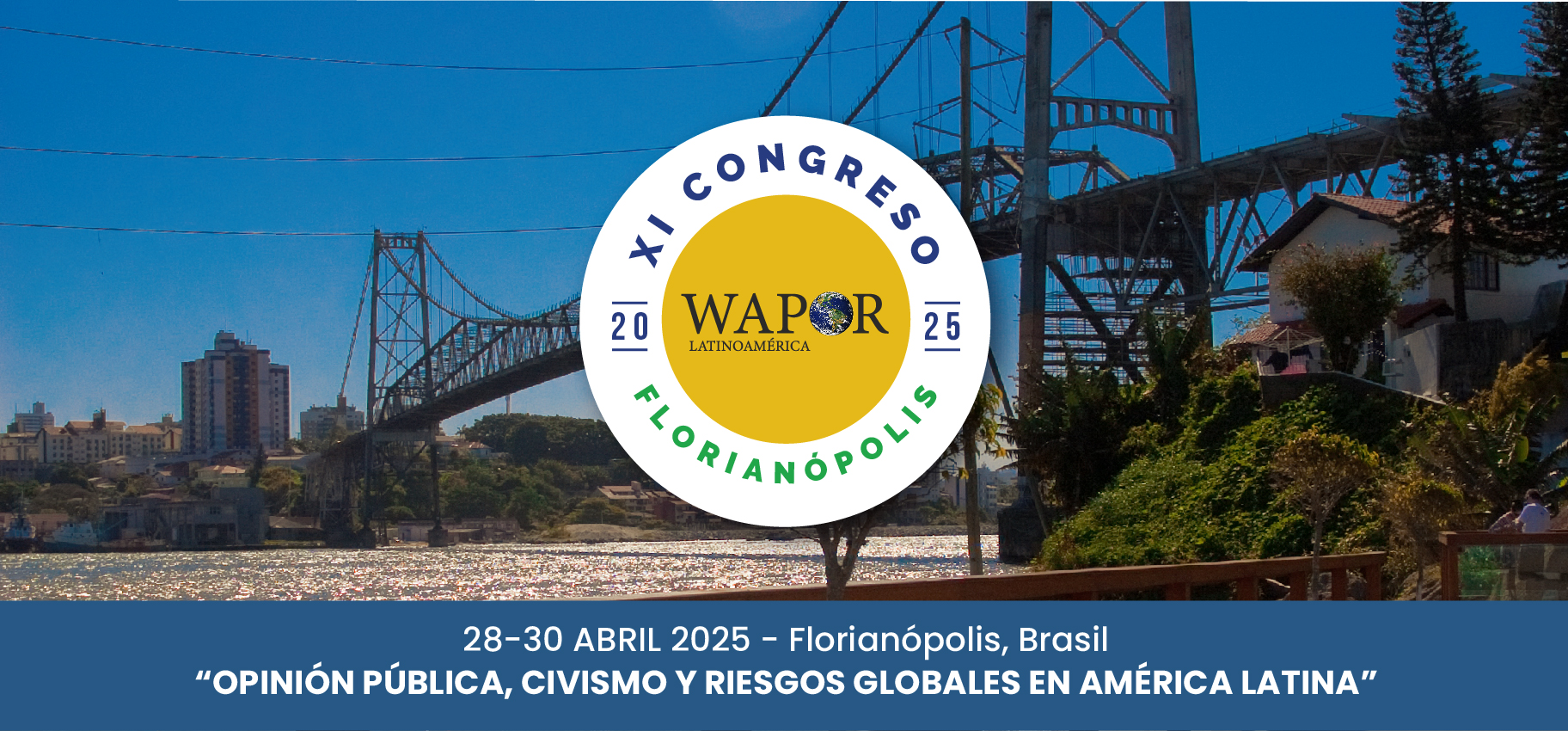Call for papers: XI WAPOR LATIN AMERICA CONGRESS “Public opinion, civicism and global risks in Latin America”
WAPOR Latin America, the regional chapter of the World Association for Public Opinion Research which brings together specialists in research on public opinion, communication and political behavior, will meet in the beautiful city of Florianópolis, southern Brazil, on occasion of its XI Congress, which will be an exclusively onsite event.
During three days, from April 28 to 30, 2025, scholars, consultants, pollsters, professionals from private market and public opinion research agencies and specialists in the areas of social and political communication who focus in Latin America will meet at the premises of UFSC (Universidade Federal de Santa Catarina) for insightful exchanges of ideas, knowledge and experiences.
The Conference theme is “Public opinion, civicism and global risks in Latin America” as current trends in the region echo challenging issues concerning the sources of democratic stability and consolidation such as an increasing uncivic culture fed by polarization of public opinion, distrust in political institutions, excessive individualization, among other factors. On top of this the accumulation of global risks such as climate change and environmental crises, AI-based manipulation of information and knowledge for citizen decision-making, accentuation of inequalities, endemic corruption, the rise of authoritarian or populist leadership, the economic and psychological effects of pandemics, the corrosion of social cohesion and public authority, among others further heightens the threat to the sustainability of a democratic public order.
The mission and contribution of quality public opinion studies puts our industry and profession as part of the solution and not the problem. Regrettably, this last perspective is what lies behind the numerous attempts at restrictions or censorship (particularly on electoral surveys), which only intensifies information asymmetries that overlap social inequalities. Confronting these challenges is critical, which makes so crucial the existence of WAPOR Latin America and the generation of opportunities to disseminate learnings from research and exchange ideas as the XI Congress of WAPOR Latin America promises to be.
The official languages of the XI Congress are Spanish and Portuguese, although presentations in English will also be accepted. Three keynote speakers will approach the Conference themes from different perspectives. Pedro Magalhães, professor at the University of Lisbon will focus on democratic support in times of rising autocratisation; Fabián Bosoer, opinion editor of Clarín (the largest newspaper in Argentina), will discuss the meaning of public opinion in times of post-truth; and Felipe Nunes, a well-known pollster in Brazil will share his insights on the future of applied survey research based on his involvement in dozens of electoral campaigns.
The XI Congress will host several workshops on day one, covering a plurality of highly engaging issues, such as innovation in experimental research, new tools for data visualization, advances in measuring democratic attitudes, models for electoral forecasting, and theory and practice of research on disinformation.
Presentation topics include but are not limited to:
- Values, beliefs and norms of public opinion: changes and continuities
- Trust and support for democracy and its institutions (political parties, republican powers, civil society organizations)
- Global risks: (in)security and climate-environmental, economic, gender, migratory and informational justice
- Main problems of society: climate change, social identities, sustainability, war, inequality, corruption and security
- Mental and public health, well-being and happiness in post-pandemic times
- Old and new forms of authoritarianism and control: Populism, surveillance, repression, clientelism, and political-social intolerance
- Polarization, radicalism and dogmatism (political, cognitive, affective, economic and technological)
- Political representation: old and new forms
- Political knowledge, interest, self-efficacy and sophistication
- Party identification, political visions and ideologies
- Public opinion, elections, electoral campaigns and voting
- Political behavior, participation and political culture
- New forms of political participation: cyberactivism, virtual deliberation, online voting, political consumption and social pressure
- Rule of law and social identities in Latin America
- Social conflict, protest, apathy and political order
- Conditions and regulations for conducting and publishing public opinion studies
- Public opinion, public diplomacy and conflict resolution
- Public opinion, public policies and monitoring of key indicators and development programs
- Measurement and quality indicators of democracy in Latin America
- Public information, public opinion and the role of journalism and the media
- New sources of information from public opinion (influencers, bloggers, YouTubers) and the use of social networks
- Challenges of disinformation (fake news, conspiracy theories, fact-checking) in the digital age
- Methodological challenges and progress in the areas of sampling, measurement, survey and questionnaire design, and response rates
- Best practices for elite and stakeholder opinion research
- Panel studies, longitudinal surveys and global tracking to monitor public opinion
- Progress and developments in qualitative research
- Innovations in opinion and social humor data collection tools (AI, applications, data mining/big data, social network analysis, machine-learning, etc.)
- The conceptual and interpretative challenges of artificial intelligence (AI) for public opinion research and polling methods
- Comparative research and international surveys
- Problems and solutions in measuring and collecting data in different cultures or societies (cultural sensitivity, data privacy regulation, technology regulation)
- New tools for visualizing public opinion data
Submission guidelines:
- Papers: should have up to 500 words, either in Spanish, Portuguese or English.
- Proposals for Special Sessions/Panels/Roundtables as well as Roundtables from our network of Allied Associations
- Posters: should have up to 300 words, either in Spanish, Portuguese or English.
- Abstracts for Papers and Posters should indicate title, author(s), Theme of reference.
- For Panels, Sessions and Special Roundtable proposals, we shall accept proposals with up to 800 words that must contain: Title, Theme of reference, participants, chair, format (paper presentation, discussion/debate, etc). Since all parallel sessions are planned to last 90 minutes, the maximum number of presenters will be 4 (15 mins each).
More information about the congress: https://www.waporlatinoamerica.org/proximo-evento-brasil-2025/
We look forward to seeing you in Florianópolis!



